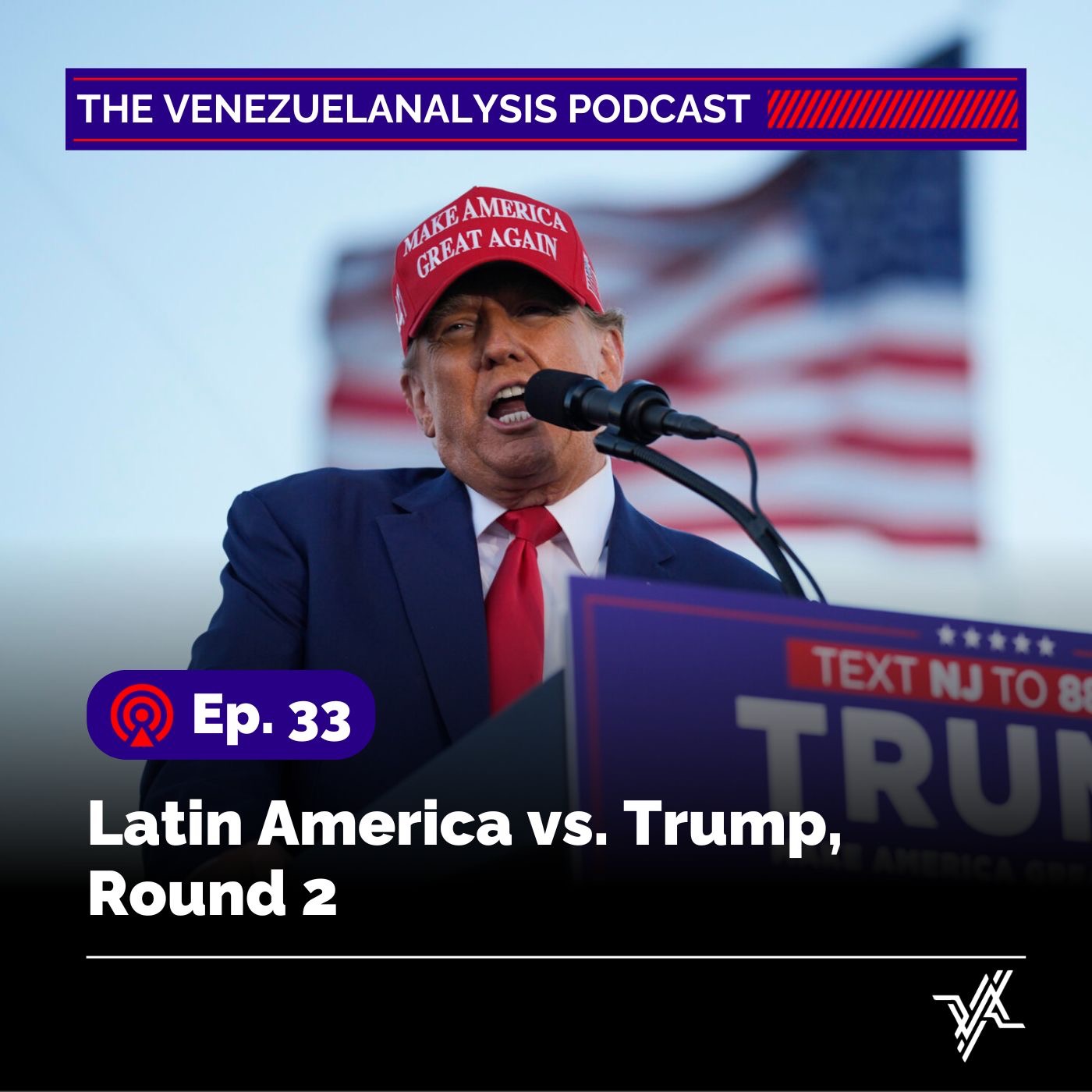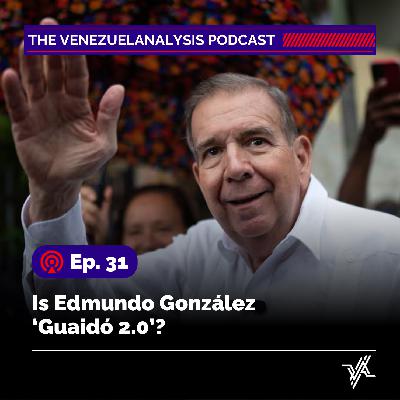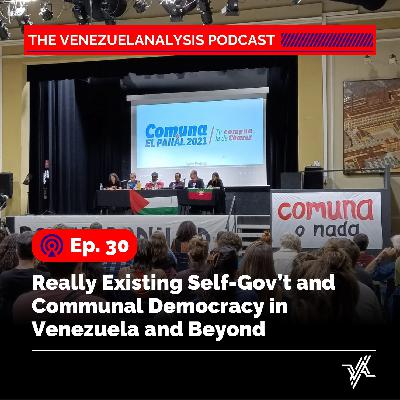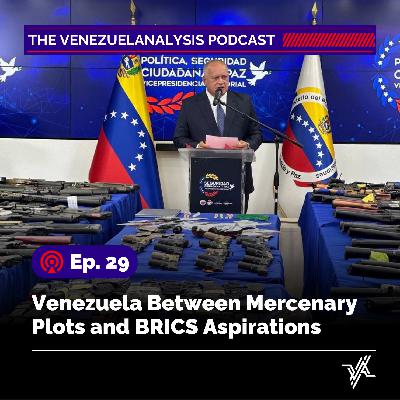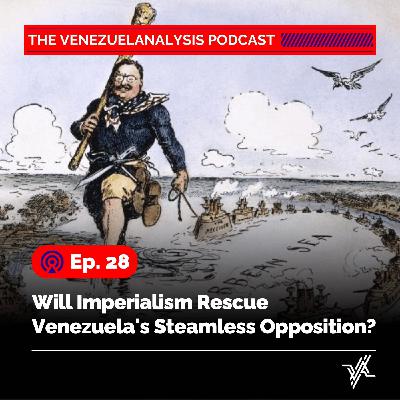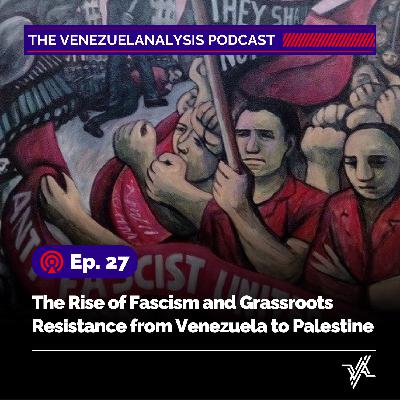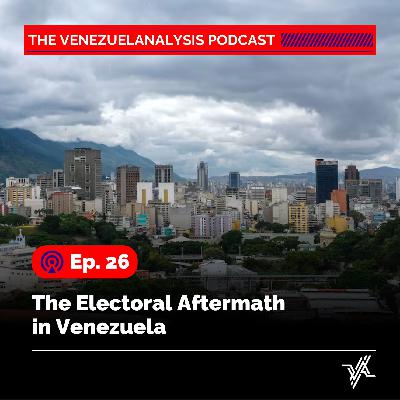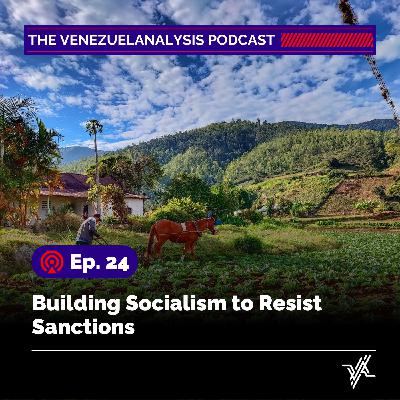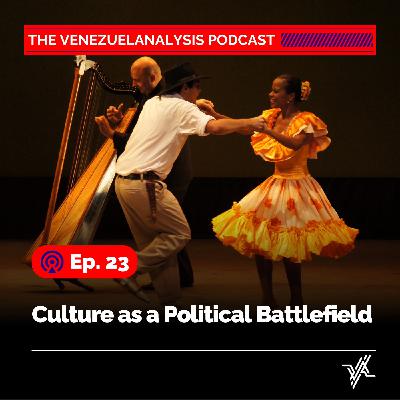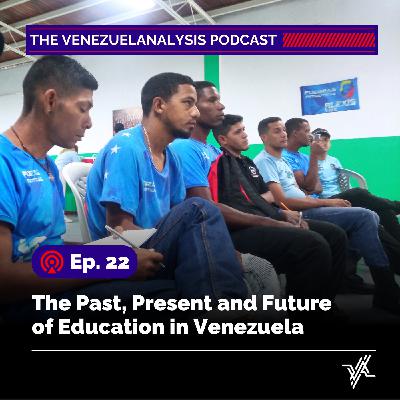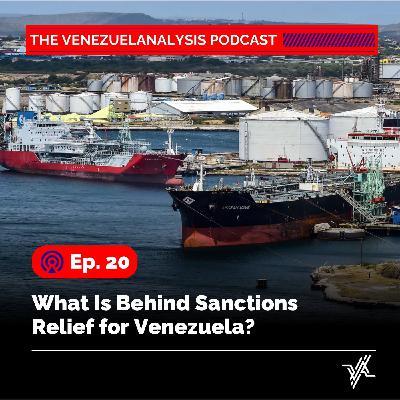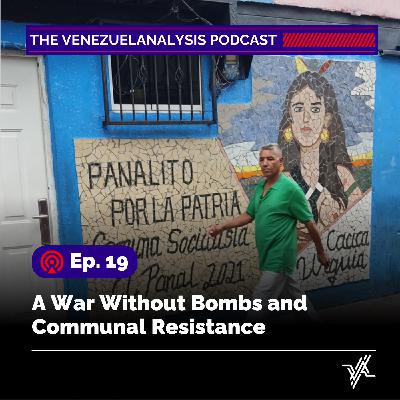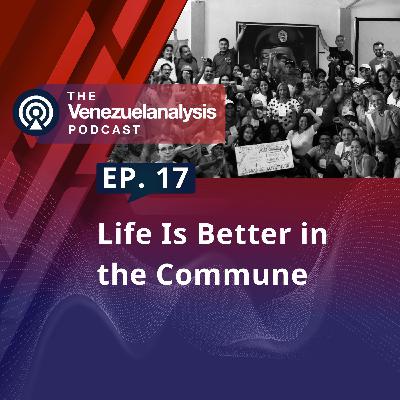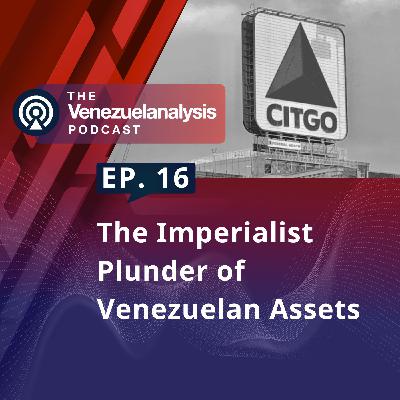Discover Venezuelanalysis
Venezuelanalysis

Venezuelanalysis
Author: Venezuelanalysis
Subscribed: 20Played: 296Subscribe
Share
© All rights reserved.
Description
The Venezuela Analysis podcast brings independent, on-the-ground English-language coverage of Venezuela and the Bolivarian Process. You’ll hear news and in-depth analysis about the country, as well as coverage of leftist and grassroots forces.
48 Episodes
Reverse
Our latest podcast episode coincides with International Working Women's Day (March 8) to take stock of popular feminist struggles under the Bolivarian Revolution in Venezuela.VA staff member Cira Pascual Marquina joins host José Luis Granados Ceja to discuss the impact of sanctions on women, the role of women in popular power, a recent conservative/religious offensive, and lots more!
The Trump administration has wasted no time in targeting migrants, with a criminalizing discourse and human rights violations galore. In this context, Venezuelans have been specially singled out, with more than 100 sent to Guantánamo.In this podcast episode, VA members José Luis Granados Ceja and Ricardo Vaz took stock of the latest developments, the emerging narratives, and the different moving parts in the US-Venezuela relations.
In the latest of episode of the Venezuelanalysis podcast Host José Luis Granados Ceja is joined by fellow VA writer Cira Pascual Marquina and Sentido Común's Kurt Hackbarth to discuss what the second Donald Trump presidency has in store for Latin America. We talk about what we can conclude thus far based on these early hectic first weeks, what his mass deportation plans have in store for US regime change efforts and the lessons we can draw from the first time around.
In our yearly review, the editorial team from Venezuelanalysis looks at the state of the economy in Venezuela today, including efforts to build a grassroots alternative, as well as the 2024 presidential election and its aftermath. Plus we take a look at what 2025 might have in store for Venezuela and the Bolivarian Process.
The Venezuelanalysis podcast tackles the proverbial million-dollar question everyone is talking about: is the Trump administration about to do a rerun of the "interim government," this time with Edmundo González in place of Juan Guaidó?Host José Luis Granados Ceja is joined by fellow VA writer and editor Ricardo Vaz to talk about the different scenarios, sanctions and the economic balancing acts the Maduro government is facing.
The latest VA podcast episode dives into the recent Congress on Communal Democracy, exploring its history, participants, and its mission to build grassroots alternatives to “liberal democracy.”Host José Luis Granados Ceja, fellow VA member Cira Pascual Marquina and Catalan activist Isa Chacón discuss the limits of current political systems, the power of collective self-determination and autonomy, and examples of communal governance in Venezuela and elsewhere. Closing with a call for global solidarity, the congress’ manifesto champions anti-imperialism, radical social transformation, and a new path forward beyond the status quo.
The latest Venezuelanalysis podcast episode catches up on the latest developments from Venezuela on many fronts.Host José Luis Granados Ceja is joined by fellow VA writer Andreína Chávez Alava to discuss the recent arrests of foreign nationals and weapons seizures, the XVI BRICS Summit, and new corruption allegations in the Venezuelan oil industry.
With the Venezuelan opposition in disarray following its most recent attempts to take power, the ball is now in Washington's court. Where does the US empire go from here?Venezuelanalysis podcast host José Luis Granados Ceja and editor Ricardo Vaz went over the different scenarios in the latest episode. The conversation also covered the plunder of assets like CITGO, the thirst for Venezuelan resources and the global interconnectedness of imperialism.
The Venezuelan political landscape has seen the farthest-right sectors, led by María Corina Machado, emerge as the leaders of the opposition. But this trend is far from unique to Venezuela. From Argentina to Italy, and with the Gaza genocide as the ugliest exponent, fascism and its violent impact are growing.In the latest VA podcast episode, staff members José Luis Granados Ceja and Cira Pascual Marquina are joined by writer and podcaster Justin Podur to discuss the alarming rise of fascist forces on a global scale and the grassroots efforts to fight back.
Following a short hiatus, the Venezuelanalysis Podcast is back with a new format. On-the-ground staff members are set to feature more prominently, with the podcast now published on YouTube and delivered on a more regular basis.In this episode, host José Luis Granados Ceja is joined by editor Ricardo Vaz to catch up on the latest from Venezuela: renewed US sanctions, Edmundo González's exile, aircraft piracy and lots more!
The brutal US-led sanctions campaign has led grassroots socialist organizations to reinvent themselves and come together to survive the conditions created by the economic blockade. In our latest podcast episode, we go deep into communes and the socialist project in Venezuela, discussing the challenges in building a communal economy, political autonomy and lots more. Host José Luis Granados Ceja is joined by Venezuelanalysis’ Cira Pascual Marquina who shares her experiences documenting the efforts of communards to build their productive capacity and end their isolation. We also speak with Juan “Juancho” Lenzo, co-founder of Tatuy Televisión and the Communard Union’s communications coordinator, to discuss the genesis of the Communard Union and its role in defending socialism as the strategic horizon of the Bolivarian Revolution.Music: Embandolaos - Los Caimanes NegrosDionis Bahamonde Alan Gonzalez Eli Rondon y Truk - Comuna o Nada
With the US reimposing oil sanctions, we look at the implications and how grassroots socialist movements hold the key to fighting back. On today’s episode we talk with Laura Lorenzo about the Pueblo a Pueblo initiative, a grassroots plan for organizing the production, distribution, and consumption of food that directly connects agricultural producers with urban dwellers. Host José Luis Granados Ceja is also joined by Venezuelanalysis editor Ricardo Vaz to discuss the decision by the Biden administration to once again impose an oil blockade on Venezuela.Music: Embandolaos - Los Caimanes NegrosTyburcio - Campesino Amigo
The ruling class must establish its hegemony in order to assure its survival, and cultural production is critical to this process, dominance over our cultural lives is indispensable for capitalism to reproduce itself.As Gramsci wrote: “To achieve a revolutionary perspective, the worker must first be freed of the ideological fetters imposed on him by the cultural organizations of the ruling class.”On today’s episode we’re talking about culture as a site of political struggle. To address this topic we will speak with Luigino Bracci Roa, a communications activist, expert in digital communications and a rank-and-file worker in Venezuela’s Ministry of Culture. Host José Luis Granados Ceja is also joined by VA’s Andreína Chávez to talk about music as a space for constructive criticism within the Bolivarian process and the role of cultural expressions such as the gaita Zuliana as a reflection of the central place that voices of the people should occupy. Music: Embandolaos - Los Caimanes NegrosBetulio Medina - La Grey Zuliana
Venezuelan President Hugo Chávez sought to build a participatory democracy that would directly include the population in decision making and knew that a robust education system, one that would seek to incorporate those historically excluded from the formal educational system, was indispensable.From primary school all the way into higher education, Venezuela massively expanded educational opportunities for the population since the onset of the Bolivarian Process. Unfortunately today, under a brutal economic blockade, many of those gains have been rolled back. Venezuela’s public education system suffers from underfunding, with high rates of academic desertion, and low wages for teachers. But better outcomes in education are still possible if there’s the political will to fight for them.To address this topic, host José Luis Granados Ceja speaks with Dr. Luis Bonilla Molina, former vice-minister for education and current co-director of the Latin American Council for Social Sciences’ International Research Center Other Voices on Education. José Luis also talks to Venezuela Analysis’ Cira Pasqual Marquina about the role of movements and organizers to promote educational inclusion and participation, her own experience as an instructor at the Pluriversidad Patria Grande in Caracas and her efforts at political education through the Escuela de Cuadros program. Music: Embandolaos - Los Caimanes NegrosQue Vivan los Estudiantes - Los Guaraguao
By retaking control of the region’s natural resources, pink-tide governments throughout Latin America were able to make great strides in the redistribution of wealth, working to attend to the social debt owed to the population. But this came at a cost. Today there is a clear global consensus that climate change is real and we risk making the planet uninhabitable if we do not take urgent action immediately.How can progressive and leftist governments in Latin America work to secure climate justice? Should we consider de-growth as the strategy, as some progressive thinkers advocate? What of anti-extractivism, which has become a common position among many on the left throughout the world? Or does the solution lies in the communalization of life?To help us answer these questions, host José Luis Granados Ceja speaks with Liliana Buitrago, environmental activist and Researcher from the Venezuelan Political Ecology Observatory. This episode also features a conversation with Venezuela Analysis’ Cira Pasqual Marquina on the efforts by environmentalists and communards in Venezuela to tackle the issue of climate change in their communities.Music: Embandolaos - Los Caimanes NegrosEfren Clavo - La Tierra Está Sufriendo
What is behind the decision by the US Treasury Department to suspend sanctions on Venezuela? Is it because of increased Venezuelan migration to the US? Is it owed to fears of wider instability in the Middle East? Or has the White House finally come to terms with the failure of the current regime-change strategy?You won’t be surprised to learn that the answer is yes, to all of that, and more. In our latest podcast episode, host José Luis Granados Ceja is joined by fellow VA member Ricardo Vaz and political analyst Ociel López to break down Washington's calculations, the potential impact of the licenses, and where the Venezuelan political chessboard factors in.Music: Embandolaos - Los Caimanes NegrosGino Gonzalez - A Palestina
On today’s episode, we present to you two new books on Venezuela. The first is “A War Without Bombs: The social, political and economic impact of sanctions against Venezuela” written and published by the Venezuelanalysis team.The book is now available to everyone to download for free on our brand new website. A War Without Bombs aims to provide Venezuelanalysis readers, internationalists, activists, and people committed to social justice with the tools to understand the devastating impact of the blockade on the people of Venezuela.Host José Luis Granados Ceja speaks with Venezuela Analysis’ Cira Pascual Marquina about the thinking behind a book on sanctions, its content, and the stories within that detail what working people in Venezuela are doing to build a socialist alternative in a country under siege.We’ll also look at Commune or Nothing! Venezuela’s Communal Movement and its Socialist Project by Chris Gilbert, professor of political studies at the Universidad Bolivariana de Venezuela. Chris talks to us about the place of communes in Venezuela’s socialist project, as well as their place as a site of struggle and resistance against the US economic blockade.Music: Embandolaos - Los Caimanes NegrosIskra - El Imperio mismo
On today’s program we’re looking into the bipartisan imperialist consensus in Washington when it comes to Venezuela.Following a recent US Congressional delegation to Brazil, Chile, and Colombia by Representatives Greg Casar, Nydia Velázquez, Joaquin Castro, Maxwell Frost, and Alexandria Ocasio-Cortez, media outlets were once again filled with headlines about the need for the US to change its relationship with Latin America. Despite the potential for this trip to “replace” or “realign” the US-Latin America relationship, public comments by lawmakers following their trip, Democrats are still deeply wedded to the US imperialist project. To talk about the very real consequences of tepid and insufficient calls by so-called progressives to merely “review” US sanctions on Venezuela, Host José Luis Granados Ceja speaks with Hector Figarella, a Venezuela-born activist and organizer with the Anti-Imperialist Action Committee. Venezuela Analysis’ Andreína Chávez also joins the program to talk about her recent piece titled ‘Clear As The Full Moon’ about the harsh circumstances Venezuela has been forced to endure at the hands of imperialism.Music: Embandolaos - Los Caimanes NegrosAli Primera - Canción para los valientes
At the end of June, dozens of popular power collectives gathered at the El Panal Commune in western Caracas to participate in the “Reflections on Communal Democracy” summit. It was a space to reflect and debate on the progress and challenges for the construction of socialism in Venezuela. In this podcast episode, host José Luis Granados Ceja is joined by Dahís Suárez and Iván Tamariz, from the Panal 2021 Commune which hosted the event. He also talks with fellow VA member Cira Pascual Marquina on the debates that took place and the bigger picture of grassroots struggles in Venezuela.Music: Embandolaos - Los Caimanes NegrosLeonardo Oropeza - Comuna o Nada
Trump’s recent candor about his push for regime change in Venezuela to secure access to oil proved that US support for the so-called interim government was never about democracy or human rights. It was always about imperialism and the neocolonial drive for the control of Venezuela’s resources. While the prospects of the US-backed opposition taking political power by force fizzled out swiftly, another plan has remained firmly in motion: the plunder of Venezuelan foreign assets.VA’s Ricardo Vaz joins host José Luis Granados Ceja to talk about US efforts to keep the so-called interim government alive and its role as an instrument to facilitate the plunder of Venezuela’s assets and resources. We then talk with investigative journalist John McEvoy to look at the status of Venezuela’s gold in the UK and the political efforts by the UK’s political establishment to deny the government access to it.Music: Armando Martinez - Mi Patria SoberanaEmbandolaos - Los Caimanes Negros




